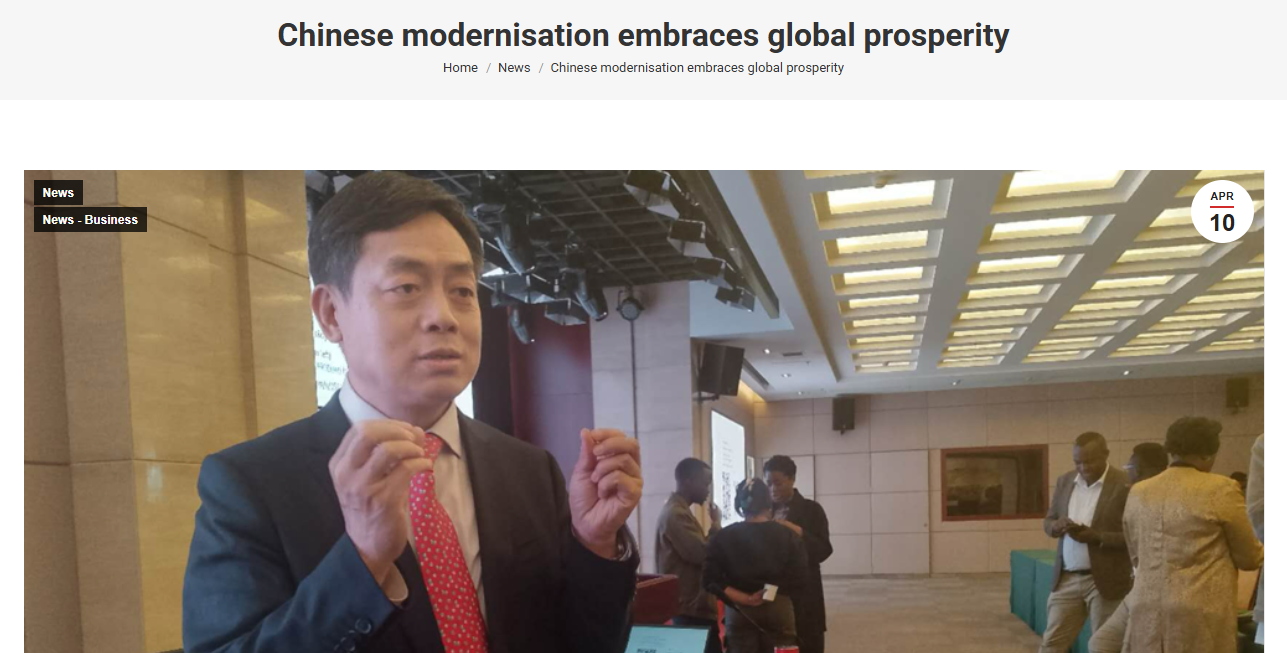LATEST INSIGHTS
Your Present Location: LATEST INSIGHTSChinese modernisation embraces global prosperity
Source: Solomon Star Published: 2025-04-10

By DELI-SHARON OSO
Reporter of Solomon Star
CHINESE modernisation, unlike other modernisations, embraces a future of shared prosperity for humanity, the Vice President of the Academy of Xi Jinping Thought on Socialism with Chinese Characteristics for the New Era, Professor Dr Wang Yiwei highlighted to visiting international journalists in Beijing on Monday.
Dr Wang, who also serves as the Jean Monnet Chair Professor and the Director of the Institute of International Affairs and Director of Center of European Studies at the Remin University of China, gave a lecture to the visiting journalists on the subject of ‘ Chinese Modernisation and Its Global Significance.’
He said China’s modernisation, started with the simple dream by its founding fathers for a better life for Chinese – ‘having ‘electricity upstairs and downstairs’ and this dream was pursued through a Chinese characterised socialism – socialism with the infusion of Chinese cultural values and this unique form of socialism kept developing, blazing a new trail for other developing countries to achieve modernisation.
Dr Wang said this Chinese-based socialism, offering Chinese wisdom and approach, provides a new option for other countries that want to speed up their development, whilst preserving their independence.
“Chinese modernisation offers humanity a new choice for achieving modernisation. The Communist Party of China and the Chinese people have provided humanity with more Chinese insight, better Chinese input, and greater Chinese strength to help solve common challenges and have made new and greater contributions to the noble cause of human peace and development,” he highlighted.
He said based on decades of exploration and practice since the founding of the People’s Republic of China in 1949, especially since the launch of Chinese reform and opening in 1978 as well as the new breakthroughs made in theory and practice since its 18th National Congress, China has succeeded in advancing and expanding its modernisation.
Dr Wang said the Communist Party of China’s (CPC’s) Central Committee on the Major Achievements and Historical Experience over the past Century noted that throughout human history, no nation has ever become strong and prosperous by relying on external forces, indiscriminately copying the governing models of other countries or blindly following in others’ footsteps and that those who have attempted to do so have either suffered inevitable defeat, or have been reduced to vassals of others.
He highlighted a symposium discussing China’s work in philosophy and social sciences on 17 May 2016 at which the CPC General Secretary and Chinese President Xi Jinping pointed out the great social transformation that contemporary China has undergone is not a natural continuation of its historical and cultural traditions, neither a mechanical application of the templates designed by authors of Marxist classics or a copy of the socialist practice in other countries of foreign models of modernisation.
Dr Wang further highlighted that in advancing modernisation, China will never tread the path of colonisation or plunder or follow the crooked path taken by some countries to seek hegemony once they grow strong, but rather take the right course of peaceful development.
He said China’s modernisation is rooted in its own national conditions, draws from the experience of other countries, carries the imprint of history and traditional culture, contains modern elements, delivers benefit to the Chinese people and at the same time advances the common development of the world.
“It is a sure path for us to build a stronger nation and realise the rejuvenation of the Chinese nation. It is also a path we must take to seek progress for humanity and harmony for the entire world,” Dr Wang underscored.
The journalists from the Asia Pacific region, Africa and Europe are on a three-month study tour in China hosted by the China International Press Communication Center (CIPCC). Dr Wang’s lecture marked the commencement of the tour, which will include visits within Beijing and to other Chinese provinces.























































































 京公网安备 11010802037854号
京公网安备 11010802037854号





